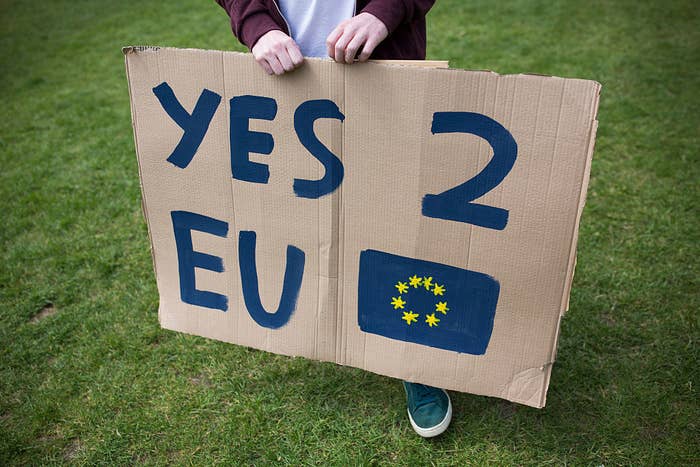
One of the fears relating to Brexit is that the UK's example will be emulated elsewhere in the EU. However, polls undertaken in the aftermath of the historic referendum appear to show that support for EU membership is on the rise in some countries.
In Denmark, a Voxmeter poll shows that nearly 7 in 10 Danes now support EU membership, up from 60% a week before Britain’s vote. The same poll found support for holding a referendum dropping to 32% from 41% over the course of the same seven days.
In Finland, a poll released last week also saw a rise in support for EU membership: up from 56% in March to 68%. In Sweden, backing for EU membership has seen a smaller increase compared with earlier levels, but is nevertheless supported by a majority (52%) according to a TNS Sifo poll carried out after the UK referendum.
The leaders of Denmark, Sweden, and Finland have all pledged to stay in the EU in the wake of the UK decision.
As the political vacuum and economic risks triggered by Brexit "have begun to crystallise", there are signs that the immediate impact on public opinion across the continent is not limited to Nordic nations.
In the weekend after the referendum, Spain held a general election. Before the vote, anti-establishment and populist parties were expected to perform strongly. The left-wing Unidos Podemos alliance was polling in second place in pre-election surveys, ahead of the mainstream Socialist party.
In the end though, voters weren't prepared to gamble. The alliance underperformed expectations and came a disappointing third, while the safer option, the mainstream ruling conservative People's Party, did much better than polls had suggested, winning the most votes and seats.
Meanwhile, in Europe's largest economy, Germany, 82% of respondents polled by Forsa said they would vote to remain in the EU if a referendum were held in their country. Only 14% would back leaving the EU. More than 70% are opposed to a UK-style referendum, according to the same poll published on the Monday after Britain's vote.
The recent polls though suggest a contrasting and complicated picture.
On the one hand, voters seem to be put off by the economic and political uncertainty in the UK immediately following the vote. But on the other, they also show that the appetite for anti-establishment parties is in many cases still strong – and in some countries on the rise.

In France, where levels of Euroscepticism are not too dissimilar to Britain, a TNS poll released on 28 June by TNS Sofres found that 33% of French voters are in favour of "Frexit", 45% are opposed.
Marine Le Pen, leader of the far-right Front National (FN), who was all smiles on 24 June, has pledged to hold a referendum on EU membership if elected president in 2017. According to opinion polls, Le Pen is currently on track to make the second-round run-off in next year's presidential election.
However, experts suggest that unless Brexit turns out to be a runaway success for the UK, Le Pen will find it extremely difficult to carve out a path to the presidency on an anti-EU platform because dislike for the EU is not the same as wanting to exit.
The view is shared by French government officials. Ahead of the UK referendum they told BuzzFeed News they didn’t believe there was a majority of voters for the FN behind an out vote alone.
They believe that a greater risk, in France and elsewhere, could be posed by potential instability that leads to question marks over specific aspects of the EU, such as Schengen and the euro, or to security concerns in eastern Europe due to the possibility of heightened tensions between pro-European and pro-Russian sections of their populations.
Three countries where such post-Brexit instability will be tested at the ballot box in the near future are Italy, Hungary, and Austria.
Although recent polls in Italy also show that support for remaining in the EU is strong, at the same time they reveal that the populist Five Star Movement (M5S), which is campaigning to leave the euro, could defeat prime minister Matteo Renzi's centre-left coalition in a second-round run-off vote were a general election held today.
Italy is expected to hold a referendum on a constitutional reform package in October. Renzi has said he will resign if the vote does not pass, which could in turn lead to early elections.
On 2 October, Hungary will stage a referendum on whether to accept mandatory EU quotas for relocating refugees. On the same day, Austria will be holding a rerun of its presidential election after the county's constitutional court concluded that the earlier vote, held in May, had to be annulled because there had been irregularities in the handling of postal votes. On that occasion, independent candidate Alexander Van der Bellen narrowly beat far-right candidate Norbert Hofer by some 30,000 votes. If Hofer wins in October he would become the first democratically elected far-right head of state in Western Europe since the end of the second world war. Hofer's party, the anti-immigration Freedom Party (FPÖ), leads in nationwide polls.
A far-right anti-immigration party, the Party for Freedom (PVV), also leads polls in the Netherlands. The party's leader, Geert Wilders, called for a referendum on the Netherlands' membership of the EU the day after Britain voted to leave the bloc.
